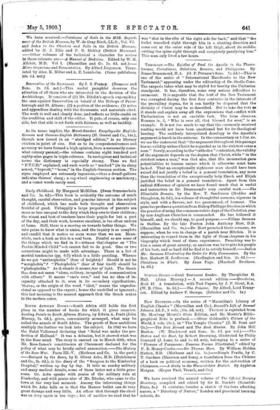THEOLOGY.—The Epistles of Paul the Apostle to the Thessa- lonians,
Corinthians, Galatians, Romans, and Philippians. By James Drummond, M.A. (G. P. Putnam's Sons. 7s. 6d.)—This is one of the series of "International Handbooks to the New Testament," appearing under the editorship of Dr. Oren° Cone. The exegesis takes what may be styled for brevity the Unitarian standpoint. It has, therefore, some very serious difficulties to surmount. It is arguable that the text of the New Testament was corrupted during the first four centuries in the interests of the prevailing dogma, for it can hardly be disputed that the divinity of Christ may be so described. But to take the text as it stands and explain away all the expressions that conflict with Unitarianism is not an enviable task. The locus c/assicus, Romans ix. 5, "Who is over all, God blessed for ever," is an example. It is not too much to say that the commonly received reading would not have been questioned but for its theological bearing. The suddenly interpolated doxology in the Apostle's argument is harsh in the extreme. In the commentary on 1 Cor. xv. we see the statement that "the argument throughout this passage has no validity unless Christ be regarded as in the strictest sense a man." Surely, according to the " orthodox " contention, the validity of the argument depends on the dogma that Christ, while " in the strictest sense a man," was God also, that His incarnation gave potentialities to human nature which it otherwise must have lacked. That an exceptionally righteous man should have been raised did not justify a belief in a general translation, any more than the translation of the exceptionally holy Enoch and Elijah justified the belief in a general translation. Apart from this radical difference of opinion we have found much that is useful and instructive in Dr. Drummond's very careful work.—The Illimitable Domain, by the Rev. T. Sanderson (Hodder and Stoughton, 39.6d.), is a volume of thoughtful sermons, vigorous in style, and with a flavour, not too pronounced, of humour. The preacher prefixes a quotation from Bishop Phillipps Brookes,in which the practice of using the commemorative days of the Christian year by non-Anglican Churches is commended. He has followed it himself, and, we should say, to good purpose.—Village Sermons in Outline. By the late Fenton John Anthony Hort, D.D. (Macmillan and Co. 6s.)—Dr. Hort preached these sermons, we suppose, when he was in charge of a parish near Hitchin. It is interesting to regard them in the light of those chapters in his biography which treat of these experiences. Preaching was to him a cause of great anxiety, so anxious was he to give his people of his best, and so hard did he find it to satisfy himself.—Judica Me: Sermons Illustrating the Order for Holy Communion. By the Rev. Herbert H. Jealfreson. (Skeffington and Son. 2s. 6d.)— Christians in Khaki. By Jesse Page. (Marshall Brothers.
6d.)






































 Previous page
Previous page